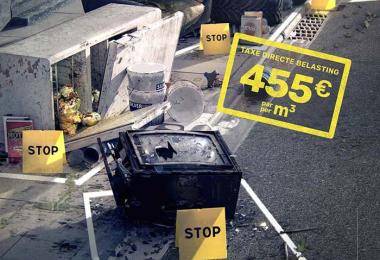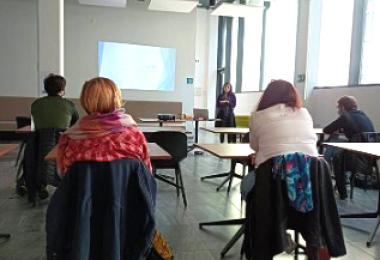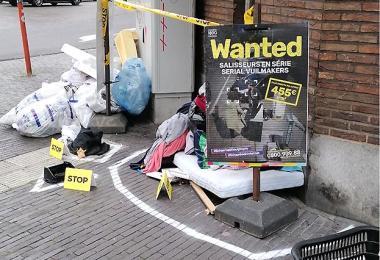12
Enforcement: apply fines and other penalties more systematically, and communicate about them, in order to reduce anti-social behaviour in public spaces
Measures
50. Reinforcing strategic and operational collaboration between Bruxelles-Propreté, the Brussels municipalities, the police zones and, where applicable, Brussels Prevention and Safety, in order to set up joint enforcement actions, established on the basis of a control plan.
Through mutual agreement, structuring and formalising collaboration protocols and shared strategies between Bruxelles-Propreté, the Brussels municipalities, the police zones and, where applicable, Brussels Prevention and Safety, in order to set up joint enforcement actions, established on the basis of a control plan.
51. Reinforcing the use or sharing of cameras as a means of combating anti-social behaviour, especially fly-tipping, in public spaces.
Increasing the use of cameras as a means of combating anti-social behaviour, especially fly-tipping, in public spaces, in collaboration with the stakeholders, within an overall approach of sharing certain tools.
Surveillance cameras make it possible to deter, identify and punish the perpetrators of environmental offences in areas identified as problematic. Many public actors therefore choose to use them to combat fly-tipping. In the Brussels-Capital Region, this is true of most municipalities, as well as regional actors such as Bruxelles-Propreté and Safe.brussels.
At present, Bruxelles-Propreté uses six working cameras and six dummy cameras. The functional cameras are used to book between 150 and 250 offences per year. Bruxelles-Propreté plans to increase the number of working cameras to ten in 2023. Although they cannot be used to identify and penalise offenders, the dummy cameras act as a deterrent. They are also far less expensive for the authorities, both to buy and to operate.
Safe.brussels has recently offered to make cameras available to all prevention and safety bodies in the Region. This temporary loan scheme and the pre-processing of alerts are intended to meet regional organisations’ needs according to their different roles. The Safe.brussels service thus pools the fleet of cameras and optimises their use. Fifteen cameras are currently in use in the region; ultimately, 48 will be available.
In addition, in connection with the implementation of this measure, an inventory of cameras used and available will be drawn up with a view to pooling the efforts of the different actors.
An initiative of Safe.brussels

52. Introducing immediate administrative action for offences relating to urban cleanliness in order to counter a sense of impunity through the strict application of fines.
Introducing immediate administrative action for offences relating to urban cleanliness in order to emphasise the strict application of financial penalties and counter a sense of impunity on the part of the public. The relevant ordinance was adopted on its second reading on 28/04/2022 and is scheduled to enter into force in May 2023.
53. Studying the possibility of introducing alternative penalties, such as mandatory training in waste management rules or citizen litter collection work.
Studying and, where appropriate, implementing alternative penalties that raise awareness of public cleanliness issues, such as training in waste management rules or immersive experiences such as civic service through participation in a citizen waste collection event.
The municipalities of Auderghem and Ixelles have both implemented alternatives to administrative fines for certain offences relating to cleanliness in the form of awareness-raising and training.
Auderghem offers mediation between a cleaning service manager and an offender. This procedure generally results in the offender performing remedial work for the municipal road or cleaning service, lasting around four hours, during which they accompany a street-sweeping worker on their daily round. Since the introduction of this project in 2019, 101 out of 291 offenders have responded favourably to the offer of mediation.
Ixelles offers an alternative in the form of an information session. Over the span of three hours and through various activities, participants are encouraged to discuss anti-social behaviour, reminded of the rules for sorting waste properly and made more aware of the importance of sorting and managing waste. Their attention is drawn to their obligations and they are informed of the services offered by the municipality and the Region. In 2019, 126 of the 192 offenders who were offered the opportunity took part in the information and awareness sessions.
An initiative of the municipality of Auderghem and the municipality of Ixelles.

54. Improving the prevention of public cleanliness offences by communicating about penalties or posting information in problem locations about the amounts and the number of fines imposed.
As a means of prevention, ensuring more communication about the sanctions provided for and applied when the rules of urban cleanliness in public spaces are broken. In places where problems are often experienced, using various means to display the amounts of the fines, in order to discourage anti-social behaviour. In addition, displaying the number of fines already handed out at a given location to reinforce the perception of real and frequent checks by the authorities.
In 2021 the municipality of Schaerbeek launched an awareness campaign concerning fly-tipping. The campaign had a twofold objective:
- To draw attention to waste so that it is perceived as an ‘eyesore’;
- To make people aware that fly-tipping in public spaces is an offence with serious consequences.
The communication campaign alluded visually to TV detective series, making fly-tipped waste clearly visible with paint on the ground and cordoning it off with tape so that it could no longer be ignored. A video was also produced showing images from surveillance cameras catching a van in the act of dumping waste. (https://www.youtube.com/watch?v=ieQ-LFJzdlI)
An initiative of the municipality of Schaerbeek

